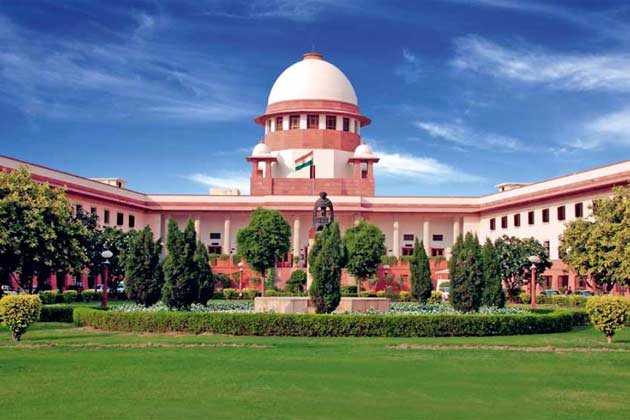
The Supreme Court ruled on Tuesday, February 6th, that members of backward castes who have profited from reservation should step down from their reserved status so that those who are still considered backward might take advantage of affirmative action.
The hearing on the permissibility of sub-classification within the SC/ST reservation began on Tuesday with the Constitution bench—which included Chief Justice of India DY Chandrachud and justices BR Gavai, Vikram Nath, Bela M Trivedi, Pankaj Mithal, Manoj Misra, and Satish Chandra Sharma—making some important remarks regarding the purpose of reservation for marginalized groups and the need for administrative efficiency. Subclassification within SC/ST reservations was advocated for by Punjab’s advocate general Gurminder Singh and the state’s additional advocate general Shadan Farasat.
In an effort to overturn a High Court ruling that eliminated SC-ST quota priority reservation for historically underrepresented groups, the Punjab government has appealed to the Supreme Court. For the reservation system to prioritize the “extremely backward” sub-sects of scheduled castes (SC) and scheduled tribes (ST), the state government enacted a statute in 2006. Nevertheless, the Punjab and Haryana High Court rejected the legislation, pointing to a Supreme Court rule that forbade such sub-categorization.
On the first day of the hearing, Justice BR Gavai—reportedly a Dalit himself—made the comment that a Dalit from one state may run for office in another state from a reserved seat, which raised basic problems regarding reservations for the oppressed classes. He continued by bringing up the topic of reservation privileges for the offspring of high-ranking officials from the backward class. Is it fair to provide reservations to the offspring of those who are already quite well off? Is it fair to give children of IAS and IPS personnel reservations? he inquired.
The finest amenities are available to members of the SC/ST community once they have gained access to central services such as IAS and IPS. But the reservation benefits will go on for his and their children’s generations. Does this need to go on? “May I inquire?” Justice Gavai bid.
On the second day of the hearing, KK Venugopal, a prominent advocate and former attorney general, cited Justice Krishna Iyer to argue that the powerful should not benefit from the creation of a sub-category of disadvantaged Dalits; otherwise, the poor will be left powerless.
The most disadvantaged members of economically disadvantaged groups should be acknowledged and given the means to attain economic parity, according to Punjab Advocate General Gurminder Singh. According to senior counsel Nidhesh Gupta, 33% of Punjabis are SCs, whereas 29% are Balmikis (Churas and Bhangis) or Mazhabis (Sikhs). He boasted that out of 81% of SC positions in the state administration, 43% belonged to Scheduled Caste communities.
Justice Vikram Nath probed the Punjab advocate general during the hearing to find out whether the state was in favour of excluding SC/ST subcastes that have continuously outperformed non-reserved categories from the reservation advantages.
“Why is it that there shouldn’t be an exclusion?” Some sub-castes under a certain category have fared better than others, say you, Advocate General Gurminder Singh. Among those, they are at the forefront. After that, they need to challenge the general. How come you want to remain there? And those who are still considered to be part of the backward group should be granted the reserve. Justice Nath said that once the idea of reservation is established, one should withdraw from it.
Says Singh, “That’s the aim, and if that aim is achieved, then the purpose for which the exercise was undertaken should come to an end.”
Also adding his voice was Justice Gavai, who said that backward castes should be allowed to leave a backward class after they attain a certain degree of development and are on par with forward castes.
“However, ultimately, that decision rests with Parliament…” Well, let me tell you what occurs when someone from the SC/ST community gets into the IAS/IPS,… As soon as you settle there, your offspring will not face the same discrimination that members of other South Carolina towns do. Although, as Justice Gavai pointed out, they are also entitled to the advantages for the second and third generations through reservation.
While states are not allowed to alter the list of SC/ST groups declared by the President under Article 341, Singh did agree that subgroups that have progressed should be removed to create way for those who actually require quota benefits. Additionally, Singh mentioned that a five-judge court used the creamy layer test to determine whether SC/ST advancements were reserved for certain individuals in the 2018 Jarnail Singh case.
In response, the CJI said that there is an exception that applies to both forward and backward castes when it comes to reservation, and he or she questioned whether the exception could be expanded to give more particular benefits to the most disadvantaged members of the backward class.
Can the same standard that we have used to justify exclusion in the backward-versus-forward context not also be used to justify that exclusion? That is the only question that remains. Is it not possible for the state to claim, “I am not removing your community from the President’s Scheduled Castes list; rather, I am categorizing particular communities within those lists as more backward and, consequently, requiring more protection based on the same standard of substantial equality?” “CJI Chandrachud said,” the court confirmed.
It all comes down to relative backwardness, as advocate Gurminder Singh told the court. The relativity argument in backwardness, according to Singh, “places them at 50%,” and the more backward they are, the more reservation they have within the reserved. He went on to say that no one, not even the constitution’s framers, saw reservations as an eternal concept.
Twenty years ago, the Indian Supreme Court issued a ruling against the practice of granting reservation benefits to “extremely backward” sub-sects within scheduled castes (SC) and scheduled tribes (ST). Legislation authorizing reservations for such sub-groups under the SC-ST quota was passed by the Punjab Assembly in 2006, two years subsequent. Nevertheless, in 2010, the Punjab and Haryana High Courts overturned this law, citing the 2004 Supreme Court decision in the case of E.V. Chinnaiah v State of Andhra Pradesh. This decision is currently under consideration by a seven-judge Constitutional Bench after the Punjab government appealed it to the Supreme Court.



